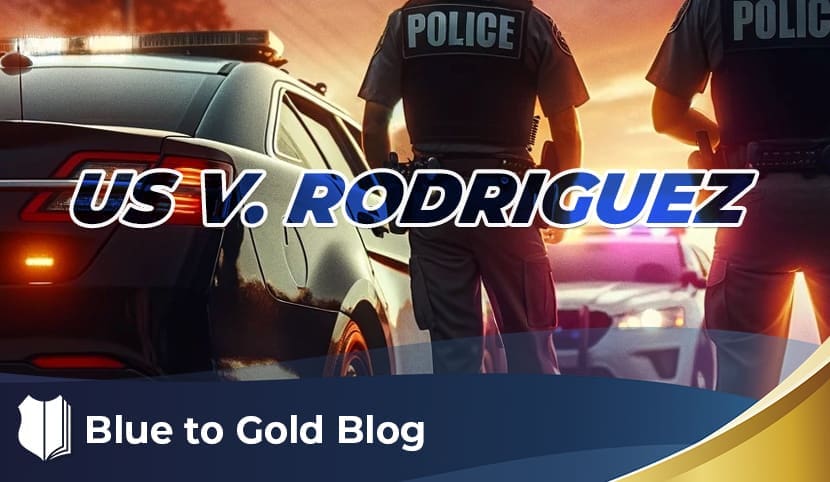As I travel around the country teaching, I still find that many people either misinterpret or are confused about the Rodriguez case. So, let’s go back in time and clarify.
Understanding Rodriguez v. United States
Rodriguez is a Supreme Court case that held that officers cannot extend a traffic stop beyond its original mission to pursue other unrelated investigations.
For example, let’s say you suspect someone is involved in criminal activity—such as drug trafficking, illegal firearms, or stolen property—but you need a reason to stop them. So, you pull them over for a taillight violation or a moving violation.
If that is your stated reason for the stop, you do not automatically get a free investigation into drugs, weapons, or stolen goods. The Supreme Court made it clear: you must stay on mission.
This makes sense because under the Fourth Amendment, a traffic stop is a detention, and you must conduct your investigation diligently. If you choose to stop someone for a taillight violation, that is your mission.
What Rodriguez Does NOT Mean
Some officers believe Rodriguez means that, no matter what happens during the stop, they can’t extend it—even if they develop reasonable suspicion of another crime. That is incorrect.
For example, whether the stop was pretextual or not, let’s say you pull someone over for speeding. During the stop, you notice indicators of criminal activity—things like:
- Inconsistent travel plans
- One-way rental car
- Criminal history
- Recent border crossings
You start to suspect drug trafficking. Can you extend the traffic stop to call a K-9 unit and conduct a sniff?
The answer is absolutely YES.
The Rodriguez ruling only applies when an officer detains someone beyond the necessary time without reasonable suspicion. If, during a lawful stop, you develop reasonable suspicion of another crime, you can extend the stop to investigate that suspicion—including calling for a K-9.
In fact, in Rodriguez, the Supreme Court sent the case back to the lower court, saying:
“Your officer unlawfully detained the suspect for seven minutes without reasonable suspicion. However, did the officer have reasonable suspicion? If so, the detention may have been legal.”
How Long Can You Detain Someone for a K-9?
Now, how long can you extend a stop while waiting for a K-9 unit?
In most states, the answer is whatever is reasonable under the circumstances—there is no strict time limit.
Some cases have upheld detentions lasting:
- Over an hour
- 30 minutes
- 10 minutes, depending on the circumstances
The only state with a strict rule is Nevada, where officers have exactly 60 minutes to get a K-9 unit on scene. No other state has a hard time limit like this.
Case Law Supporting Extended Stops for K-9s
Since Rodriguez, courts across the country have ruled that officers may extend a traffic stop if they develop reasonable suspicion. Here are just a few examples:
- Garcia (Maine)
- Green (Third Circuit)
- Bustero (Fifth Circuit – Louisiana)
- Other rulings in: Kentucky, Michigan, South Dakota, Nebraska, Utah, Indiana, and more
Bottom Line
If you only have a traffic violation, you must stay on mission and cannot extend the stop without reasonable suspicion.
BUT if you develop reasonable suspicion of another crime—like drug trafficking—you can extend the stop, call a K-9, and investigate further. Just make sure your reasonable suspicion is clearly documented.











